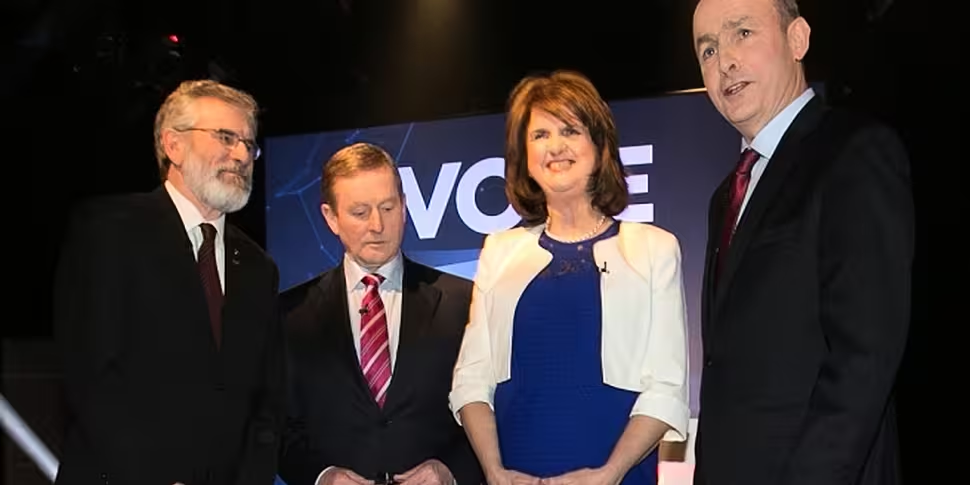TV3, in association with Newstalk, hosted the first live leaders' debate of the election 2016 campaign.
The debate was moderated by Newstalk’s Pat Kenny and TV3’s Colette Fitzpatrick.
An Taoiseach and leader of Fine Gael Enda Kenny TD, Tánaiste and leader of the Labour Party Joan Burton TD, leader of Fianna Fáil Micheál MartinTD, and leader of Sinn Féin Gerry Adams TD attended this special four-way leaders’ debate.
Did the debate change any minds? It's unlikely as it turned into a shouting match and at times was difficult to hear the points the Leaders were trying to make. We can only hope that lessons will be learned from tonight's performances and that following debates will be more considered and informative. So what did we learn from this evening?
Taxation
The key battle relating to taxation centered around USC.
Sinn Fein stated that they would only get rid of it for people earning under €19,500 and would introduce an additional tax of 7% on every euro for those earning over €100,000. The party also presented a policy of increasing the employer's PRSI rate to 15.75% on all income over €100,000.
This was attacked by Enda Kenny who said that it would force out those who are the main drivers of the economy, who earn more money and pay less tax elsewhere. It will also inhibit those people who wish to come home.
The difficulty for Micheal Martin here was that Fianna Fail are also going to tax at 8% for earnings over €100,000 and get rid of USC for everybody earning €80,000 or less.
Fine Gael plan to get rid of the USC completely. Both they and Labour were able to attack on these grounds, restating what Enda Kenny said about those could leave and others who wish to return.
Health
The biggest battle, as we knew it would be, was people on trolleys. It was somewhat bizarre that people didn't know exactly how many people were on trolleys. Enda Kenny stated that the current position was 20%, better than when Fianna Fail were in office. This isn't the case. There were 92,000 people on trolleys in 2015. In 2010 this number stood at 75,000. However, the Dublin hospitals fared marginally better, 37,000 in 2010 and now 33,000 in 2015.
The other issue was Universal Health Service, the Cuban solution, which never really got much traction from the debate. Enda Kenny however did admit that Fine Gael weren't able to keep their promises on the Universal Health Charge and that they had failed on the issue of medical cards.
Housing
The argument over housing was primarily over two issues. Bizarrely, the party leaders didn't discuss homelessness as a main point, it was glossed over. None of the leaders seemed to consider that it was a big issue.
The main issue became social housing, who built what and who didn't?
The Government was accused of doing nothing for the last five years on social housing. Michael Martin attempted to make a virtue of the fact that Fianna Fail built 14,000 social houses while his party was in government. However the reality is that if legislation were adhered to from 2006 to 2011 when 172,000 houses were built the number of social houses during that time should equate to 34,000, 20,000 more than the reality.
The stipulation was that 20% of all houses built by developers were to be social houses. However, in many instances, developers were permitted to pay a sum of money in compensation rather than building the houses. The 20% rule would have meant that 80,000 houses should have been built over that decade (2001-2011). If those houses had been built over that decade, we wouldn't be struggling for social housing now.
Crime
Crime was quite clearly Gerry Adams' weakest point in the debate, not unexpectedly given he was trying to defend the indefensible, dissolving the Special Criminal Court and having jury trials for everyone. The case of Robert McCartney was introduced, a man who was dragged out of a bar in Belfast and savagely murdered. However, none of the approximately 40 people in the bar were willing to testify.
The other main elements were gangland crime and the falling number of Gardaí. Micheal Martin accused the Government of letting the police force dwindle while Kenny responded that Martin was responsible for closing Templemore with no new Garda replenishing the force for five years. Martin claimed he would bring the Garda force up to 15,000 if he were in office. The reality is it would take a minimum of five years to reach this number.
8th Amendment
The only winner here was Joan Burton and this was the highlight of her night. She was the only one who definitively answered the question, proposing a referendum to let the people decide. The three male party leaders huffed and puffed and refused to answer, particularly Enda Kenny who took two and a half minutes to not answer the question. What this proved was that they feared the reaction of the members of their own parties which was a lesson learned by Enda after the difficulties he had with enforcing the party whip on the Protection of Life bill.
Listen back to the full debate below:









